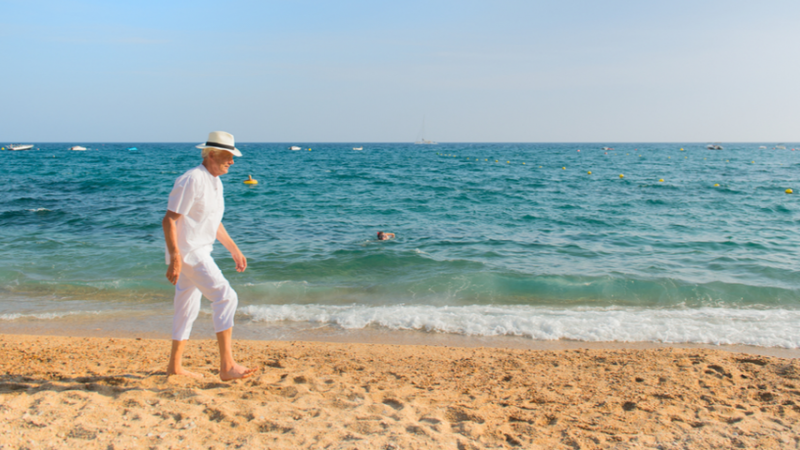With lush green grass, blue skies, sandy beaches and an abundance of sunshine—summer is officially in full swing! A lot of people enjoy the summertime, as it gives them a break from the colder months and more time spent outdoors with their loved ones.
Summer also means an increase of UV (ultraviolet) rays, which creates a high-risk of harm from unprotected sun exposure, especially for older adults. It’s essential older adults shield themselves from direct sun to protect themselves from health and skin risks, such as melanoma and skin cancer.
Learn more about the dangers of too much sun for older adults, and how to prevent sun risks so you can (safely) enjoy outdoor fun with your family and friends without worry!
Elderly and Sun Exposure
Aside from concerns about sunburns, there are other conditions triggered by prolonged sun exposure that can be dangerous for older adults in the summer months.
Melanoma and Skin Cancer
Did you know you have a greater chance of developing skin cancer as you age? According to the Skin Cancer Foundation, between 40 and 50 percent of Americans who live to age 65 will have at least one skin cancer. More specifically, melanoma is commonly found in men on the area of the body between the shoulders and hips or head and neck, and in women, it pops up on the arms and legs.
Heat Stroke
When it comes to heat stroke, older adults are especially susceptible to feel the negative effects of the sun. Heat stroke can be extremely dangerous, as it is the most serious heat-related illness and is characterized by the body being unable to control its own temperature. If you’re concerned about sunstroke, older adults should be aware of the following symptoms, courtesy of the Centers for Disease Control:
-
An extremely high body temperature (above 103°F)
-
Red, hot, and dry skin (no sweating)
-
Rapid, strong pulse
-
A throbbing headache
-
Dizziness
-
Nausea
If heat stroke goes untreated, it can cause permanent damage or even death. If you experience any of the above symptoms, seek help—immediately.
Cataracts
Cataracts are clouding over the lens of the eye, which lead to blurry vision. They are often associated with aging; however, many people don’t realize that prolonged exposure to sunlight can lead to cataracts. According to the National Eye Institute, the following symptoms are signs that you might have cataracts:
-
Cloudy or blurry vision
-
Colors seem faded
-
Headlights, lamps, or sunlight may appear too bright; a halo may appear around lights
-
Poor night vision
-
Double vision or multiple images in one eye (this symptom may clear as the cataract becomes larger)
-
Frequent prescription changes in your eyeglasses or contact lenses
If you’re 50 years old or older and experience any of the above symptoms, you should make an appointment to see an eye doctor for a check-up.
Preventing Sun Damage
While melanoma, heat stroke, and cataracts are different types of sun-induced conditions, they can all be prevented by taking extra measures to protect your skin from the sun. Additionally, the right summer skin care for older adults can end up keeping you healthier in the long-run.
Wear a hat and sunglasses. Covering up during the summer months might seem counterintuitive, but it will end up protecting your most vulnerable assets. A hat can help prevent melanoma from developing on your head, while sunglasses with UV protection can keep your eyes safe from cataracts.
Wear SPF 30 or higher (and re-apply!) Develop the habit of applying sunscreen every morning before leaving the house and re-apply every two hours spent in the sun.
Stay hydrated. The added heat from the sun in the summer months can make you more dehydrated. Drink plenty of water—13 cups for men and 9 cups for women—-in order to avoid overheating.
Look for shade. While it can be nice to set up your beach chair out in the open, a beach umbrella will give you the option of a shady retreat from the sun when you need it. It won’t only protect older adults from sunstroke, it can also help to prevent skin cancer.
Check your meds. Be sure to talk to your pharmacist or read the fine print that comes with your prescriptions. Certain types of medications do not interact well with the sun and can lead to additional health complications.
Ensure 24/7 Protection and Peace of Mind
You can never be too careful when it comes to the sun and hot temperatures. Learn more about our mobile, GPS enabled and water-resistant medical alert devices to make sure you stay protected while you’re on-the-go and enjoying the sunshine. We encourage you to get outside, get active and live your life to the fullest!


